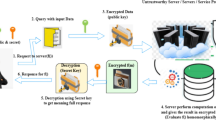
Overview
- Provides Single-source reference to Fully Homomorphic Encryption (FHE)-based computing
- Discusses design challenges for an FHE-based system, using different hardware backends (CPU, GPU, FPGA, and ASIC)
- Includes detailed discussion of compute and memory bandwidth limitations in FHE-based computing
Part of the book series: Synthesis Lectures on Computer Architecture (SLCA)
Access this book
Tax calculation will be finalised at checkout
Other ways to access
About this book
This book provides an introduction to the key concepts of Fully Homomorphic Encryption (FHE)-based computing, and discusses the challenges associated with architecting FHE-based computing systems. Readers will see that due to FHE’s ability to compute on encrypted data, it is a promising solution to address privacy concerns arising from cloud-based services commonly used for a variety of applications including healthcare, financial, transportation, and weather forecasting. This book explains the fundamentals of the FHE operations and then presents an architectural analysis of the FHE-based computing. The authors also highlight challenges associated with accelerating FHE on various commodity platforms and argue that the FPGA platform provides a sweet spot in making privacy-preserving computing plausible.
Similar content being viewed by others
Keywords
Table of contents (5 chapters)
Reviews
Authors and Affiliations
About the authors
Rashmi Agrawal received her M.S. degree in Computer Engineering from Boston University, Boston, USA in 2017. She is currently a Ph.D. candidate in ECE department at Boston University. She is a member of the Integrated Circuits and System Group (ICSG) and is advised by Prof. Ajay Joshi. She received best paper awards at GLVLSI 2020 and ICCD 2020. Her research interests include designing efficient architectures and co-processors for post-quantum cryptography and hardware acceleration of privacy-preserving computing using fully homomorphic encryption.
Ajay Joshi received PhD from Georgia Institute of Technology in 2006. He was a Post-Doctoral Researcher at Massachusetts Institute of Technology from 2006 to 2009 and a Visiting Research Scientist at Google from 2017 to 2018. He is currently a Professor with the Department of Electrical and Computer Engineering (ECE) at Boston University (BU). He received the Google Faculty Research Award 2018 and 2019, Best Paper Award at ASIACCS 2018, the BU ECE’s award for Teaching Excellence in 2014, and NSF CAREER award in 2012. Broadly, his research interests include computer architecture, security, digital VLSI, and silicon photonics.
Accessibility Information
Bibliographic Information
Book Title: On Architecting Fully Homomorphic Encryption-based Computing Systems
Authors: Rashmi Agrawal, Ajay Joshi
Series Title: Synthesis Lectures on Computer Architecture
DOI: https://doi.org/10.1007/978-3-031-31754-5
Publisher: Springer Cham
eBook Packages: Synthesis Collection of Technology (R0), eBColl Synthesis Collection 12
Copyright Information: The Editor(s) (if applicable) and The Author(s), under exclusive license to Springer Nature Switzerland AG 2023
Hardcover ISBN: 978-3-031-31753-8Published: 25 July 2023
Softcover ISBN: 978-3-031-31756-9Published: 26 July 2024
eBook ISBN: 978-3-031-31754-5Published: 24 July 2023
Series ISSN: 1935-3235
Series E-ISSN: 1935-3243
Edition Number: 1
Number of Pages: XI, 76
Number of Illustrations: 1 b/w illustrations, 16 illustrations in colour
Topics: Circuits and Systems, Computer Hardware, Cyber-physical systems, IoT, Cyber-physical systems, IoT



